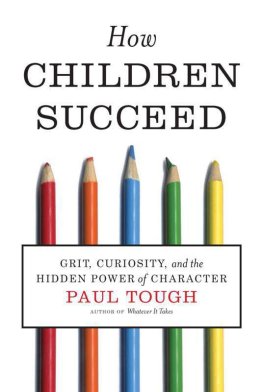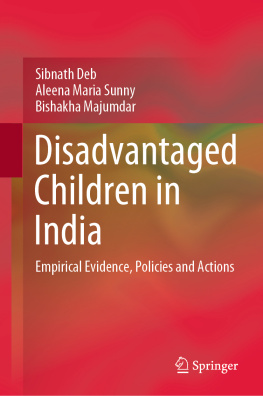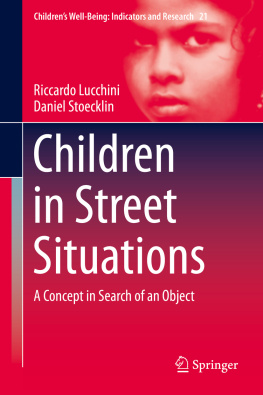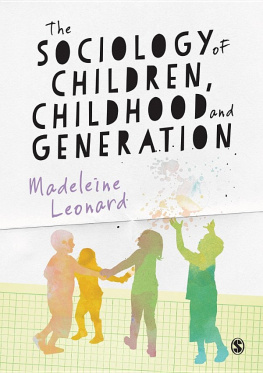Lost Childhood
Lost Childhood explores the everyday lives of street children in India. It presents insights on their life on the streets to provide a comprehensive understanding of why they are driven to extreme means of livelihoods.
This volume,
Inquiries into the histories of street children, and discusses their socio-economic and socio-demographic characteristics to provide a sense of their living conditions;
Sheds light on the social injustice experienced by these children, their health and hygiene, and also looks at the insecurities faced by the children in their interactions with the society;
Uses detailed field research data to highlight issues that affect the lives of street children such as education, gender discrimination, and their social networks;
Suggests a way forward that would not only benefit street children but will also be of use to the community in understanding their lives, problems, and help explore this issue in further detail.
The book will be useful to scholars and researchers of human geography, development studies, child development, urban poverty, and social justice. It will also be of interest to policymakers, social workers, and field workers who work with street children.
Kapil Dev works as an Assistant Professor in the Department of Geography in St. Wilfreds P.G. College, Jaipur. He was awarded his Ph.D. from Jawaharlal Nehru University, New Delhi for his research on the conditions of Street Children in Delhi. For his M.Phil., he focused on the characteristics of the Rural workforce. His fields of expertise are Street Children, Rural Work Force, Crime, Population Geography and Remote Sensing. He has published several papers on crime against women, and migrant workers in India.
Dipendra Nath Das is a Professor in the Centre for the Study of Regional Development, and the Dean of the School of Social Sciences in Jawaharlal Nehru University, New Delhi. In his more than 26 years of career, he is involved in teaching since the last 20 years. His fields of expertise are Urbanisation, Migration, Population Geography, and applications of geospatial tools in different issues of social research. He has published numerous research articles in national and international journals of repute. He has authored two books on Child Labour, and Population of India.
Sangeetha Esther is pursuing her Doctorate in Population Studies from the Centre for the Study of Regional Development in Jawaharlal Nehru University, New Delhi. Her current topic of research is Retirement Planning among Salaried workers. She did an extensive study of homeless women in the night shelters of Delhi for her M.Phil. She has volunteered with various organisations that deal with street and slum children, including Delhi Urban Shelter Improvement Board where she helped manage the Government Night Shelters.
First published 2021
by Routledge
2 Park Square, Milton Park, Abingdon, Oxon OX14 4RN
and by Routledge
52 Vanderbilt Avenue, New York, NY 10017
Routledge is an imprint of the Taylor & Francis Group, an informa business
2021 Kapil Dev, Dipendra Nath Das and Sangeetha Esther
The right of Kapil Dev, Dipendra Nath Das and Sangeetha Esther to be identified as authors of this work has been asserted by them in accordance with sections 77 and 78 of the Copyright, Designs and Patents Act 1988.
All rights reserved. No part of this book may be reprinted or reproduced or utilised in any form or by any electronic, mechanical, or other means, now known or hereafter invented, including photocopying and recording, or in any information storage or retrieval system, without permission in writing from the publishers.
Trademark notice: Product or corporate names may be trademarks or registered trademarks, and are used only for identification and explanation without intent to infringe.
British Library Cataloguing-in-Publication Data
A catalogue record for this book is available from the British Library
Library of Congress Cataloging-in-Publication Data
A catalog record has been requested for this book
ISBN: 978-0-367-44072-5 (hbk)
ISBN: 978-1-003-00801-9 (ebk)
Typeset in Sabon
by codeMantra
Dedicated to All the children living on the streets instead of their homes, working instead of attending school, sleeping hungry instead of being tucked into bed every night with a full stomach.
To all the children who have been abused and misunderstood by the society.
Policymakers, social workers and many organizations are constantly taking up different issues to tackle the problem of downtrodden children. Street children, the mundane social evil in most of the metropolises, still constitute a sizeable proportion of child population, who are unable to get the attention they deserve. These children, who are an integral part of the nations future, have their childhood withered away, with people remaining unaware of their crisis. Street children are seen by all, and live their lives out in the open, yet ironically very little is known about them. These children are enveloped in enigma and misconceptions. The very sight of them tugs at peoples hearts, yet as soon as they are out of sight, their troubles are out of peoples mind. The compassion for them is limited to only the moments when one encounters them. It doesnt percolate further so that it could lead to any action aimed at their long-term benefit. There is a lack of prolonged concern for them, which stems from the fact that the public doesnt know the depth of the pain and struggles of street children.
The lack of information and deteriorating conditions of street children encountered every day on the streets of Delhi sparked the idea in Kapil Dev to study and throw light on these matters. Initially, taken up as a topic for his doctoral thesis, it was found out, during the course of the study, that these children were living in such harsh conditions that even words could hardly describe. The realization that these children struggle every day just to be able to survive and ward off starvation for which they are treated with disdain was discomforting. To improve street childrens conditions, people need to be made aware and educated about how they are victims of circumstances and of an unequal system. It was felt that keeping their stories and experiences from the general public would be a great disservice to these unfortunate children, on whom this study is based. It was then the idea to write this book was conceived. The book aims to unmask the lives of the street children living in Delhi by delving into their day-to-day experiences and perspectives on the cruelties of street life. These children, even though they have experienced great sufferings, cannot articulate their pain as well as adults. For this purpose, we have tried to give voice to some of their evocative stories while keeping them anonymous. Life experiences of individuals have been shared with the reader at the beginning and ending of this book to highlight the atrocities perpetrated against some of these children and to invoke compassion for them. The hope is that after reading this book the reader can better empathize with street children whom they would come across in their daily life, and treat them with a little more love and kindness.
We would like to start by expressing our gratitude to all the street children who participated in our study. Without their trust in us this study could not have been done. These children took time out from their struggling busy days schedule to share their stories and experiences with us. Some of the children even introduced and helped us build a rapport with other fellow street children and their families, which greatly aided our survey. We are truly honoured to have been able to spend time with them and listen to their stories. We would also like to thank all the parents of the street children who helped us in our survey. We also extend our gratitude to the NGO workers who worked directly with the street children, as they helped shed light on many of the issues faced by the children.










